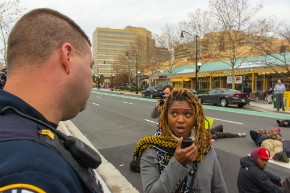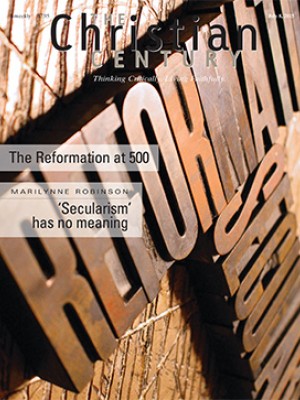Local transformations

Last month, police in the north Dallas suburb of McKinney were called to a pool party involving white and black youths. In a video of the scene that went viral, a white police officer is shown shoving a 14-year-old black girl to the ground, using his knees to pin her there, and then pointing his gun at and cursing other youths. It seemed like a movie shown too many times before—one in which white police officers use excessive force on unarmed people of color.
Lethal incidents in Ferguson, Baltimore, Staten Island, and elsewhere have prompted a national conversation on race and policing—but more is needed than a conversation. What’s needed is a spiritual and political transformation. That transformation is most likely to come from local efforts rather than national strategies.
Read our latest issue or browse back issues.
In the wake of the incident in McKinney, a local network of pastors known as the McKinney Shepherds quickly went to work to connect educators, police, and government officials. The group, which already had been talking about issues of race, organized prayer sessions and meetings with people of all races. Pastors met with the mayor and police chief to express their frustrations, and officials promised a candid investigation of the incident. About 100 pastors met at the McKinney Police Department to pray for their community and the police.
Churches can be catalysts for justice and reconciliation. That’s a role they’ve assumed not only in the racially mixed suburb of McKinney but in the small Indiana city of Goshen, at one time a sundown community, a place where black people weren’t welcome after dark. Aware of that history, the city council recently passed a resolution condemning behaviors of the past and promising to be a more welcoming city.
For Goshen, being more welcoming these days means responding to the large influx of Hispanic people who have come to the city looking for work. Led by the ministers’ association, a community relations committee was formed to gather representatives of churches, businesses, and government. Its goal is to celebrate diversity and make sure that housing, educational, and medical resources are available to all.
The local police department has also been proactive in working with the minority community. As part of that effort, the police called a meeting at a middle school to address Hispanics’ concerns. Only a few people showed up. The police discovered afterward that people had stayed away for fear that the meeting was a pretext for rounding up and deporting the undocumented.
The police changed their strategy and began holding meetings in Latino churches. Among other things, the police explained how they would and would not enforce immigration laws.
In such ways, churches, police, and civic institutions can work to build trust and to make the kind of change in behavior and attitude that endures.






